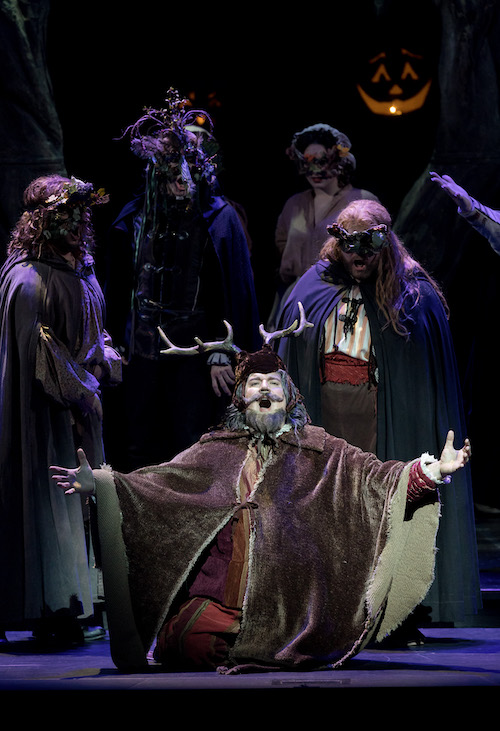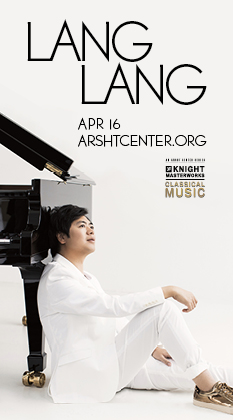Palm Beach Opera closes season in style with Verdi’s comedic “Falstaff”
Friday night marked Palm Beach Opera’s belated local premiere of Verdi’s Falstaff, and it’s not hard to see why the company has steered clear of this work.
Although his final opera is considered one of the composer’s masterpieces, Falstaff lacks the conventional appeal of such Verdi operas as Rigoletto or La Traviata, with their abundance of tunes and famous set-piece arias. And instead of doomed heroines like Gilda, Violetta or Aida, we get Sir John Falstaff, a fat, selfish, insolvent, delusional old knight who endures a cruel series of hoaxes, including a level of body-shaming that would have gotten any of his tormentors fired in the modern business world.
Yet this operatic Oliver Hardy can somehow be appealing, a sort of everyman, whose delusions and humiliations may not be all that different from those we all experience, even if they’re more extreme.
Donning a fat suit for the title role, the baritone Michael Chioldi gave a bravura performance. Moving his ponderous girth across the stage of the Kravis Center in West Palm Beach, he sang in heroic tones in a paean to his paunch, a feature in which he took peculiar pride. His denunciation of the concept of “honor” dripped with scorn. In “Va, vecchio John,” he swaggered in self-satisfaction over the apparent confirmation of his continued appeal to the ladies.
Throughout the performance, his voice matched his girth, projecting and booming effortlessly through the hall. And without overacting – aside possibly for a couple of self-satisfied twirls as he approached a meeting with Alice – he brought pathos to the absurd character, making us care about him through his humiliating swim in the Thames and his assault by an ugly mob of townspeople.
The soprano Amber Wagner was a standout as Alice Ford, the main object of Falstaff’s attention. Her rich voice soared as she read Falstaff’s ridiculous love letter and her singing arched effortlessly over the other singers in ensemble numbers.
Stuck in Falstaff’s madcap world was a pair of lovers who couldn’t have been more operatically conventional. The duets of soprano Andrea Carroll and tenor Anthony Ciaramitaro as Nannetta and Fenton provided interludes of smooth lyricism amid all the chaos. Carroll, in particular, brought a voice of notable sweetness and flexibility to the role, giving an affecting performance in the final scene dressed in white with a green garland as Queen of the Fairies.
Sets from the Canadian Opera Company were traditional and serviceable—the dark wood of the Garter Inn, the simple interior of the Ford home, the moodily lit woods dominated by a huge tree.
Verdi’s score is particularly demanding for the orchestra, with lightning-fast string passages and exposed solos for winds and brass. Conductor Antonello Allemandi led an energetic performance, as the orchestra buzzed, boomed and soared through Verdi’s complex and restless music. The conductor brought real excitement to the triumphant fugue at the end, where everyone recognizes their common humanity and all is forgiven.
Stage director Garnett Bruce let the comedy speak for itself, resisting the urge to turn the work into a spectacle of sight-gags. There was genuine tension in the scene in which all the townspeople crept up on Fenton and Nannetta in their moment of intimacy. And there was an eerie charm to the final scene in the woods, with its lit jack-o’-lanterns giving the scene an air of pagan mystery and menace.
The baritone Andrew Manea gave a subtle performance as Ford, whose wife Falstaff is chasing. After making a devious approach to Falstaff, his false friendship turned to barely controlled fury as he began to suspect his wife of cheating on him.
Lauren Decker made a delightful Mistress Quickly, playing the role with subtle comedy and singing in rich, rounded tones as she lied to Falstaff about Alice’s interest in him. As Dr. Caius, the tenor Thomas Glenn came off as irritable, irritating and pretty much the last person anyone would want to marry.
As Falstaff’s henchman Bardolfo and Pistola, Bergsvein Toverud and Eric Delagrange scampered noisily around the stage more than they needed to, but with their long, unkempt hair and shifty dispositions, they came off as appropriately scheming and unsavory. As Meg Page, the mezzo-soprano Meridian Prall rounded out the wives of Windsor effectively in their ensemble passages.
Prior to the evening’s performance, Palm Beach Opera’s executive director, David Walker, came on stage and announced next season’s operas: Puccini’s Tosca, Offenbach’s Tales of Hoffmann and Bellini’s Norma.
All those operas are popular crowd-pleasers, and it may be a while before Kravis Center audiences get to experience another Falstaff. But Palm Beach Opera deserves credit for giving audiences a chance to hear Verdi’s opera for the first time in the company’s 61-year history.
Palm Beach Opera’s production of Falstaff will be performed again 7:30 p.m. Saturday and 2 p.m. Sunday at the Kravis Center. pbopera.org
Posted in Performances
Leave a Comment
Sat Mar 25, 2023
at 9:52 am
No Comments






